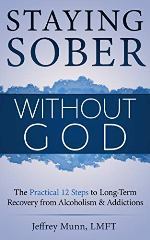This post was originally published on this site
By Jeffrey Munn
I started writing Staying Sober Without God in May of 2018. My intention for writing the book was to put my interpretation of the 12 steps into an easy-to-understand, relatively brief guide. I wanted to provide atheists, agnostics and freethinkers a path to recovery that felt less dogmatic and more inclusive, while also being careful to respect the faith-based path that has helped so many. In my recovery journey, I remember countless times feeling like a square peg trying to fit into a round hole. The connections I had with people were helpful, as was the occasional practical advice, but the faith-based component always left me feeling like I didn’t belong.
This feeling contributed to an eventual relapse, and I wanted to help others avoid having to experience anything like that. I wanted my book to serve as a sort of universal translator that allowed those without religious or supernatural beliefs to fully participate in 12-step programs despite being surrounded by messages that were ultimately meaningful but obscured by strange language and vague slogans.
In December of 2018, my wife held up her phone and recorded me sitting at my computer, ready to click the “publish now” button on Amazon’s self-publishing service. She insisted I would want to remember the moment. I was skeptical (as I tend to be). I told her the book, which was titled The Practical 12 Steps at the initial launch, was just an experiment. I said I would be happy if sales covered the cost of publication and the book helped just a couple people find a path to recovery that would have otherwise eluded them.
Two and a half years later, Staying Sober Without God has become more than I ever expected. I regularly receive emails from people around the world telling me that the book has helped them make sense of a process that was presented in a way they previously found confusing and inaccessible. A secular recovery group in Russia translated the book themselves and started a book study based on it. I’ve seen my book recommended in online recovery groups. I’ve even had religious/theistic members of 12-step programs contact me to express gratitude for providing an alternate path that doesn’t insult or demean the traditional approach. Some of these faith-based members have even stated that the book has become part of their repertoire so they can better work with atheist/agnostic sponsees. It’s surreal, and I am incredibly grateful.
At the time I wrote Staying Sober Without God, I had no appreciation for just how large the secular recovery community was. I realized that so much of the success of the book was thanks to the tireless work of those who were courageous enough to challenge traditional AA dogma and build a community of like-minded addicts and alcoholics who believed practical recovery was possible. My book wouldn’t be a fraction as successful as it is without the help of people like Roger C. of AA Agnostica, John S. of AA Beyond Belief, and all other secular members of 12-step groups who have contributed to the growth of such an important and necessary community, either through the creation of literature or simple participation. For all of you members of secular recovery groups around the world, thank you for all you do.
My hope is that Staying Sober Without God continues to widen the path of recovery and add to the already phenomenal foundation upon which our current secular recovery community is built. I hope it continues to help people see that recovery without dogma is not only possible but just as valid as any other approach. I am currently working on the workbook version of Staying Sober Without God and a 2nd edition of the original text will follow. Graduate school and family life has made the workbook a much longer project than the original book, but it is slowly coming along.
I’m excited to see how the world of secular recovery continues to grow, and I’m incredibly grateful that I get to be a part of it.
Jeffrey Munn was born in Southern California where he still resides with his wife and daughter. He is a licensed marriage and family therapist and has been working in the field of mental health since 2010.
Jeffrey works as a therapist in private practice and specializes in addiction, OCD, and anxiety disorders. In addition to his master’s degree in clinical psychology, Jeffrey earned a degree specialty in co-occurring disorders.
Click here to access the book on Amazon: Staying Sober Without God.
To visit Jeffrey’s website, click here: Practically Sane.
The post Staying Sober Without God: Three Years Later first appeared on AA Agnostica.

